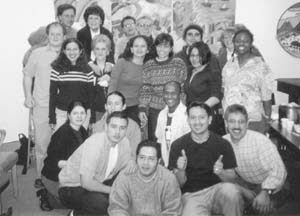


|
|
Militant/Joel Britton
|
|
Event in Chicago of the Cuba Youth Lectures Committee to welcome Cuban youth leaders Javier Dueñas, kneeling in white shirt, and Yanelis Martínez, standing directly behind Dueñas. They began their speaking tour at Loyola University in Chicago.
|
Dueñas, along with Yanelis Martínez Herrera, began three weeks of speaking engagements in the United States with talks at Loyola and the University of Illinois in Chicago on "Youth in Cuba."
Martínez, 22, is a fifth-year law student at the University of Havana and a member of the National Secretariat of the Federation of University Students. Dueñas, 28, is a professor of journalism at the University of Havana and a member of the National Bureau of the Union of Young Communists in Cuba.
A major goal of the visit of Dueñas and Martínez is to build the Second Cuba-U.S. Youth Exchange planned for Havana from July 22 to 30. Issues to be discussed include the situation of student movements and relations between Cuba and the United States. More than 25 students signed up for more information on the youth exchange in the first few days of Dueñas's and Martínez's visit.
"There is greater participation of youth in strengthening the revolution than a decade ago," Dueñas told the Loyola audience. "There is more confidence in the ideas of the revolution and youth are more involved in fighting for justice and against inequalities. Youth were the first to demonstrate for the return of Elián Gonzalez" he said.
Dueñas described a central campaign of the Union of Young Communists and the Federation of University Students to intensify the involvement of young people from poorer working-class neighborhoods. One aspect of this campaign is the attempt to draw youth convicted of petty crimes into revolutionary activity. Dueñas explained the goal was to bring young people who have committed petty crimes out of the prisons and to win more such youth to the Union of Young Communists.
The Loyola meeting was organized by the Honor's Society of the university's Department of Communication, and was also sponsored by International Studies, Social Justice Concentration in Communication, and Peace Studies.
Bren Murphy, chair of the communications department, opened the meeting. David Schweickart, professor of philosophy at Loyola who is coordinating the visit of Dueñas and Martínez, then welcomed them to Chicago. Citing statistics indicating Cuba's progress in areas of health, education, and life expectancy, Schweickart commented that not only has Cuba survived the recent years of economic difficulty, "but in some ways has even thrived."
Elizabeth Lozano, a professor of communications at Loyola, began the question period asking about the status of the media in Cuba. Dueñas answered that there has been a renaissance of journal and magazine publishing in recent years. He pointed to the youth involvement in a national campaign called "University for All," which includes television classes, accessible to all, on literature, art appreciation, history, public speaking, English, and music.
Countryside visit
The two youth traveled to Wisconsin on the first weekend of their visit to attend the annual meeting of Family Farm Defenders. They were introduced to the meeting by Randy Jasper, a Wisconsin farmer. In a presentation to the 60 participants, Martínez and Dueñas explained that unlike in Wisconsin, where six dairy farmers a day lose their land and many more live under the threat of foreclosure, a central conquest of the Cuban revolution is a thoroughgoing land reform that ended forever the possibility of farmers losing their land.
"Forty-one years ago when the revolution triumphed most of the best land and property was owned by corporations in the United States," Dueñas said. "We only had one crop, sugarcane." With the land reform, title to the land was given to the peasants who worked it and a rural infrastructure was created to expand access to education, culture, health services, as well as markets for the farmers' goods.
After their presentation, three farm youth came and spoke with Martínez and Dueñas and signed up for more information on the Cuba-U.S. Youth Exchange this summer.
On March 26 members of the Cuban Youth Lectures Committee, which was formed in Chicago to organize the national visit, held a welcoming potluck dinner and discussion with Martínez and Dueñas at Casa Guatemala here. Martínez thanked the group and explained that meetings like the one with the Wisconsin farmers "allowed us to not only explain the situation of farmers in Cuba, but also to learn what the countryside is facing here in the United States. It makes me appreciate more what the Cuban revolution has achieved," she said.
Related articles:
Defense at Miami trial exposes anti-Cuba lies
Build Cuba-U.S. youth exchange
'We knew we were defending the gains of the revolution'
Conference event presents books on Playa Girón
Cuban groups invite U.S. youth to Havana for summer exchange
October Crisis and the U.S. class struggle
Front page (for this issue) |
Home |
Text-version home